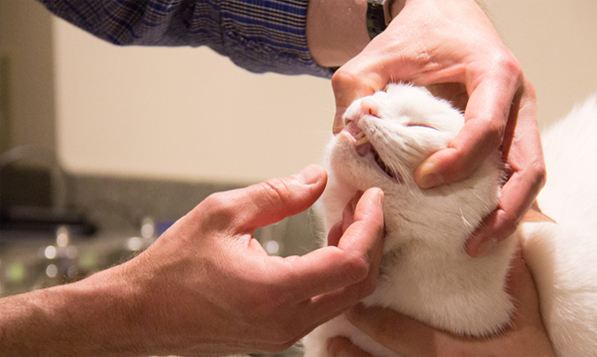Common Household Pet Toxins in North Kingstown
Your home may seem like a safe place for your pet, but there are many household items and substances that are toxic to pets. These toxic household items can cause a range of health problems to pets and, in the worst cases, can potentially be fatal. Below is a list of the most common household items known to be toxic to pets. Click on the headers for more detailed information about each item.
Human Foods
There are many human foods that, although not technically toxic to your pet, can cause your pet to become overweight and even obese if allowed too often or in large quantities. Exercise moderation and caution when feeding your pet anything that contains refined carbohydrates like flour, sugar, corn syrup, and white rice. This includes all bread and other baked goods, pasta, candy, and desserts. In general, pets should not be fed human food, except as an extremely rare treat.
The following foods and beverages are toxic to pets and should never be given to your pet:
- Alcohol (beer, wine, spirits, etc.)
- Avocados
- Baby food
- Caffeine (coffee, tea, soda, energy drinks, etc.)
- Chocolate
- Dairy products (milk, cream, cheese, ice cream, sour cream, yogurt, etc.)
- Fatty foods and fried foods
- Garlic
- Grapes/raisins
- Macadamia nuts
- Mushrooms
- Onions
- Raw meat
- Spinach
- Unripe tomatoes
- Xylitol (sugar substitute)
- Yeast dough (raw)
- Zucchini Squash
Lawn and Garden Chemicals
There are a number of substances, designed for outdoor use, which can benefit the appearance and condition of your lawn or garden, but which are also potentially toxic to your pet. These include:
- Bait traps for snails, slugs, and rodents
- Blood meal
- Fertilizers
- Herbicides
- Insecticides
- Rodenticides
Plants
Several common plants are toxic to pets if eaten or chewed. Before introducing new plants for the house or garden, please read the list of toxic plants and plant-related substances below and consider the risks. If you decide to have these plants in or around your home, take precautions to keep them well out of your pet’s reach.
- Aloe
- Autumn Crocus
- Azalea
- Baby’s Breath
- Bamboo
- Cyclamen
- Compost
- Daffodil
- Daisy
- Dieffenbachia
- Foxglove
- Hyacinth
- Iris
- Kalanchoe
- Lily
- Mushrooms
- Oleander
- Rhodendron
- Tulips
- Sago Palm
- Salt water
Medications
Always seal prescription and over-the-counter medicine containers after each use and store them in a place to which your pet has no access. Never leave any form of medication where your pet may find and ingest it. Below is a list of common medications that are toxic to pets.
- ACE (angiotensin-converting enzyme) inhibitors
- NSAIDS (non-steroidal anti-inflammatories), especially Acetaminophen (Tylenol)
- ADD/ADHD stimulant medications such as Ritalin and Adderol.
- Beta-blockers for high blood pressure
- Birth control pills
- Cholesterol lowering agents
- Supplements (vitamins, minerals, botanical extracts, proteins, amino acids, and energy supplements, including any nutraceuticals or herbal remedies that have not been recommended by a veterinarian)
- Most prescription medications
- Sleep aids
Household Solvents and Cleaners
Whether you keep household cleaners and other chemicals in your cabinets, closets, under the sink, or in the garage, it’s important to seal them tightly and store them where your pet can’t gain access to them. Some of the most common toxic household chemicals include:
- Air fresheners
- Ammonia
- Antifreeze/windshield wiper fluid
- Bleach
- Chlorine
- Cleaning solvents
- Expandable foam insulator
- De-icing salts
- Drain cleaners
- Lead
- Paint and paint thinner
- Pool chemicals
- Tar
- Zinc
Take Action
If you have any of these items or substances in your house where your pet can get to them and potentially ingest them, please take precautions to restrict your pet’s access to toxic substances.
If you see your pet ingest any of the items listed above; if your pet is exhibiting symptoms of toxic exposure, such as unexplained illness or physical distress, difficulty breathing or moving, nausea, sluggishness, or diarrhea; or if you notice a sudden, marked change in your pet’s temperament or behavior, call The Village Veterinary Center at 401-583-4560 immediately so our team can determine if your pet has been exposed to toxic substances and whether treatment is necessary. Please contact us if you have any questions about toxicity and your pet’s health.










